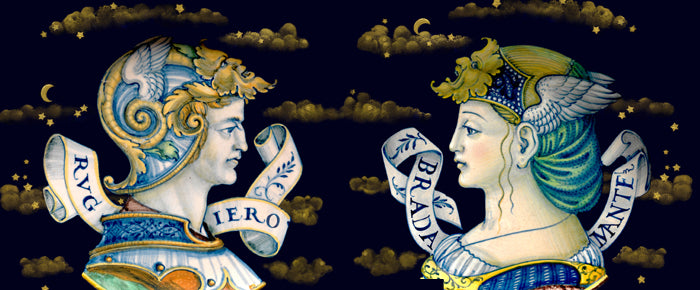In a time dominated by powerful men, Bradamante becomes a well respected Christian knight. Her beauty is praised, along with her "courage, might and expertise" which are declared to be equal to those of her famous brother Rinaldo.

Bradamante - Courtesy of Emanuele Failla [CC BY-SA 3.0 (https://creativecommons.org/licenses/by-sa/3.0)]
Even though she is a Christian, Bradamante falls desperately in love with a Saracen warrior named Ruggiero.
Their first encounter is full of romance - and danger. It is the end of the day, the battle is over, when Bradamante falls victim of a Saracen patrol. Despite being himself a Saracen, Ruggiero defends her honor because for a true knight the value of courtesy towards women transcends partisanship. It is love at first sight.

It is 800AD and the known world has never been more divided: the Christians led by famous emperor Charlemagne fight against the Muslims ruled by king Agramante, for the control of the Mediterranean. In this extremely polarized world, characters will face seemingly impossible choices: between religion or love, life or death, and even between alternative destinies.
A beautiful vintage Italian movie (dubbed in English language), "Hearts and Armour", tells one version of Bradamante's life. You can click on this link to watch it for free:
Many other versions of Bradamante's life have been told across the centuries, for example Ludovico Ariosto writes about her in his epic poem Orlando Furioso. The story we tell here is the version that has been passed down for generations in the Sicilian puppet theaters, where every season the knights come back to life through the hands of the master puppeteers. Being re-enacted on stage is a time where the line between reality and magic fades, an age that could not be further from modern rationalism. But surprisingly, the questions that arise in this story are still very much modern.

Courtesy of Ji-Elle [CC BY-SA 3.0 (https://creativecommons.org/licenses/by-sa/3.0)]
Is Love more important than Race or Religion?
Bradamante and Ruggiero are divided by different religious beliefs, cultures, and ethnicities. Will their love overcome these differences?
To make matters worse, some characters try to interfere in their relationship.
A Saracen female warrior, Marfisa, claims to be the alleged fiance of Ruggiero. She sets on a quest to find him and remind him of who he really is and where he belongs.
In the meanwhile, yet another character has aims towards Ruggiero, and for a whole different sets of reasons. His name is Atlante, a powerful sorcerer, who raised orphaned Ruggiero since infancy and wants to save him from the terrible destiny that he foresaw.
Ruggiero is in fact a man with two possible destinies. His first possible fate is to convert to Christianity, marry Bradamante and sire a line of heroes; but will be betrayed and killed soon after his marriage. His second possible fate is to remain a Saracen and be the cause of the downfall of the Christian Empire. Atlante doesn't want Ruggiero to choose Bradamante and end up killed, therefore he keeps him hidden in an invisible castle on the top of Mount Carena in Africa.
Is Love able to change one's Destiny?
Ruggiero attempts to escape from the enchanted castle, but in vain. Ultimately it is Bradamante to rescue him, providing a non-stereotypical storyline where the woman on horse and armour saves the helpless man.
However, right during a moment of passion between the two lovers, Marfisa finds them and a confrontation begins between the two women, who are both valiant female knights.

Only a revelation by the wizard will put an end to the fight: Marfisa and Ruggiero are actually siblings, separated at birth after they became orphaned.
After the astonishing revelation, the three reconcile and hug. Ruggiero also decides he will convert to Christianity in order to finally marry Bradamante.
But unbeknownst to him, king Agramante has secretly decided to end the war through a personal battle between knights, and Ruggiero himself has been chosen for the fight. A trick of the destiny wants that Charlemagne has too chosen an adversary, and his choice happens to be Bradamante's brother, Rinaldo. A deadly battle between two future brothers-in-law.
What is honor?
Ruggiero cannot escape the traditional laws of honor, and is about to fight against his potential brother-in-law Rinaldo. His hands shake, while he holds the sword. He knows there's no victory: in both cases Bradamante's heart will be broken, either for the loss of her lover or for the loss of her brother. He wonders what is the meaning of honor: is honor just allegiance even when it comes at an unbearable human cost?

But right when everything seems lost, there is an unexpected twist to the story. Another knight, a proud Saracen named Rodomonte, convinces king Agramante to choose him instead for the battle. At the last second Agramante agrees. Ruggiero fights and then ultimately defeats Rodomonte, bringing victory to Charlemagne.
Charlemagne then gives his blessings to Bradamante and Ruggiero, who finally get married.
For us this would be the happy ending marking the end of the story. But we have to remember that, in the past, other values were more important than life or personal happiness. This is why the story continues...
Can Destiny be truly defeated?
Destiny has been delayed, but it will ultimately be inescapable. After the wedding, Ruggiero will indeed be betrayed and killed. The prophecy has been fulfilled.
Death, however, is not the end of the story. Popular belief, in fact, sees life and death as a continuum of existence, and dreams have a very special role in manifesting this transformation. Not surprisingly, it is through a dream that Ruggiero reveals to Bradamante the identity of his assassin.
Bradamante and Marfisa now join forces to vindicate their beloved Ruggiero. The two female warriors slay all enemies and set fire on the castle of the betrayer. Ruggiero has been fully vindicated. The story of love and death is fulfilled.
Epilogue: a Tragedy...or the Triumph of women?
Perhaps both. It is not a coincidence that the triumph of women takes place only through extreme circumstances and tragic sets of events.
Empowered women are not a modern invention, they have always existed throughout history. But the true challenge that we historically have as a culture, is to shift the narrative of strong women from the exceptional to the ordinary.









